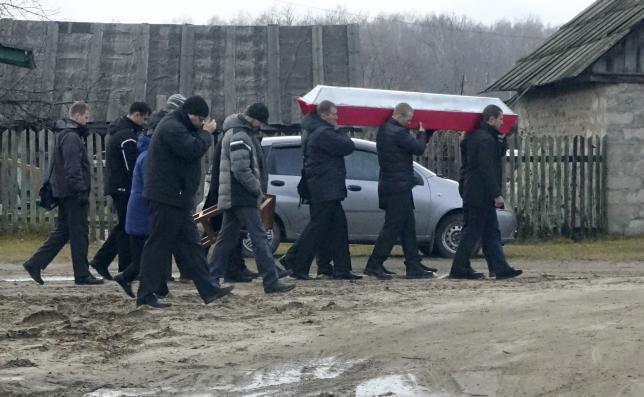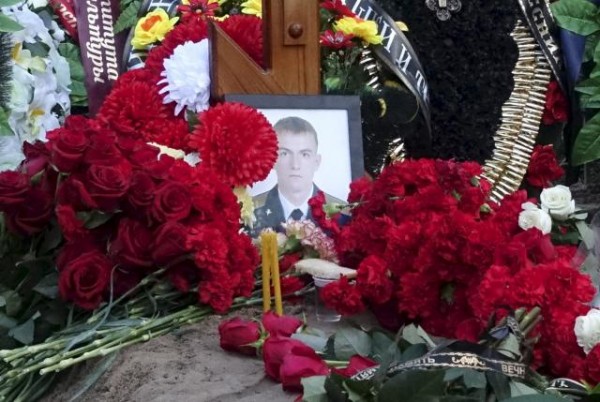
The 27-year-old Russian special forces officer smiles out of the picture in a flak jacket and camouflage hat. The last photo of Fyodor Zhuravlyov was taken in Syria, where he was deployed on a clandestine mission. At least his family know that much.
The picture now hangs in his empty bedroom, in his childhood home on an unpaved road in a village in Western Russia.
Along a wall is an extra-long sofa the family bought specially for their son, who was 192 cm tall (6 ft 4 in). On the desk is a burgundy box containing another piece of the puzzle of their son’s death: the Order of Kutuzov, one of Russia’s highest medals.
It was given to Zhuravlyov’s widow Julia in December, with no explanation as to where or how her husband earned it.
The dead soldier’s two-year-old daughter Ulyana awoke from a nap. His father Vladimir cradled the child in his hands, calling her “Fyodorovna”: Fyodor’s daughter. It wouldn’t help anyway to know how Fyodor had died, Vladimir said.
“Why would we care?… You can’t imagine what it is like to lose a child.”
That the truth of Fyodor Zhuravlyov’s death was kept even from his family reveals the degree to which Russia has safeguarded the details of its military intervention in Syria, which shifted the momentum in the five year war in favor of Russia’s ally President Bashar al-Assad.
The Zhuravlyovs learned of his death soon after Fyodor was killed in November, the news coming from his brother who also serves in a special forces unit. But they were told little else.
At the funeral, his commanding officer said Fyodor had died in a counter-insurgency operation in southern Russia, a story the family knew was false.
Only four months later did the authorities publicly acknowledge that he was killed in Syria. At a ceremony in March, President Vladimir Putin named him among four servicemen killed in the campaign. Russia says eight have died there in total.
The authorities have given no clue as to what the 27-year-old officer did to earn the Order of Kutuzov, a medal named for the general who defeated Napoleon and given in the Soviet era mainly to senior World War Two battlefield commanders.
It was revived to honor post-Soviet Russian combat leadership by a 2010 presidential decree, and the Kremlin says the list of recipients since then is a secret.
Fyodor Zhuravlyov’s award certificate, signed by Putin, is stamped number 18.
SELFIE IN THE SKY

Zhuravlyov graduated from an elite school for Russian paratroop officers and served with a special operations unit. He and his brother loved their elite military jobs, raising the paratrooper flag in the garden when they visited the house.
Fyodor trained by making parachute jumps with an oxygen mask from 7.5 kilometers altitude. A selfie he took with a mobile phone while falling though the sky now hangs on his parents’ wall.
The family became accustomed to secrecy. One of the last photos they have of Fyodor shows him in civilian clothes in the passenger seat of a plane. The face of the person next to him is obscured by a black square.
Andrei Soldatov, an expert on Russian special services, said the awarding of Zhuravlyov’s medal could shed light on Russian military tactics, possibly suggesting Russian forces played a role in guiding Syrian ground operations.
Such a young officer was unlikely to be a commander of a large Russian Special Operations unit, but could have earned the award by serving in the headquarters of a Syrian unit, possibly in charge of cooperation with Russian air forces, Soldatov said.
He would have had to have been involved in the planning or leadership of a major operation.
“It certainly was a bigger operation than directing fire,” Soldatov said. He noted that a line in the description of the medal says it can honor servicemembers for “maintaining close cooperation between forces taking part in an operation and ensuring the defeat of an enemy”.
Soldatov added: “We don’t really know what status the Russian military have in Syria. It seems Russian officials lie about that.”
In the meantime, the family struggles with the consequences of his death. His widow and the toddler moved in with his parents because they could not manage on their own near Moscow where his unit was based. His mother was hospitalized in March with a heart complaint brought on, his father said, by the stress of bereavement.
“I didn’t mind him becoming a military man. It’s a job for a man. He was a man,” said his father, suddenly tripped by his own use of the past tense. “‘Was’ is a terrifying word. He still is a man.”
REUTERS

Leave a Reply
You must be logged in to post a comment.